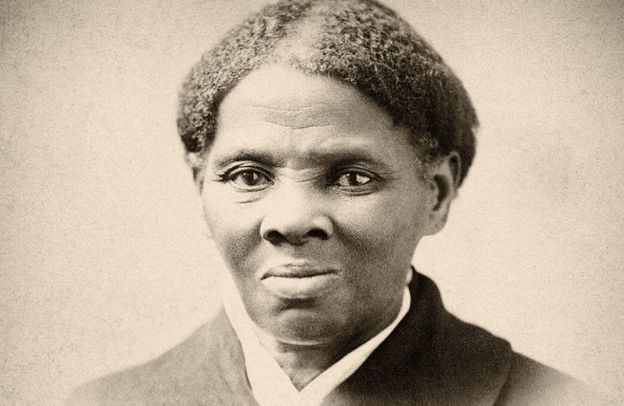Harriet Tubman, American Abolitionist and Social Activist – 1820 to 1913

In the annals of African American history, few names shine as brightly as that of Harriet Tubman. Born into slavery, she defied the chains of oppression and dedicated her life to the liberation of her people. Harriet Tubman’s remarkable journey from enslaved individual to a revered abolitionist, humanitarian, and women’s rights advocate makes her an extraordinary personality whose legacy continues to inspire generations today.
Want to learn more about the power of storytelling? Start by DOWNLOADING a free chapter of The Storytelling Series: Beginners’ Guide for Small Businesses & Content Creators by Obehi Ewanfoh.
Early Life and Escape
Harriet was born around 1820 in Dorchester County, Maryland, into the cruel and dehumanizing institution of slavery. At a young age, she experienced the anguish of being forcibly separated from her family, a devastating practice all too common during those evil regimes of human slavery. However, it was this very separation from her eight brothers and sisters that fueled her determination to forge a path to freedom and liberation, not only for herself but also for others that look like her.
According to History.com, Harriet’s parents, Harriet (Rit) Green and Benjamin Ross, named her Araminta Ross. While Rit worked as a cook in the plantation’s “big house,” Benjamin, her father was doing a tedious job as a timber worker. Araminta would later change her first name to Harriet in honor of her mother and she would dare her very destiny, placing her life on the line for what she believed is right.
In 1849, Harriet Tubman seized the opportunity to escape to the North, leaving behind the only world she had known. Guided by her unyielding spirit and a strong belief in the righteousness of her cause, she embarked on the perilous journey known as the Underground Railroad. This secret network of safe houses and courageous individuals led her to freedom in Pennsylvania, where she finally tasted the first sweet fruits of liberty.
As for where Harriet could have gotten the courage to do what she did, one report pointed to her mother who in her attempt to protect her son from being snatched and sold as a slave, she threatened to tear open the head of the slave traders if any of them dare entered her house.
Harriet would later build on that resilience, and she said one time that there were two things she had control over, either her freedom or her death and if she couldn’t get one, then she must get the other.
The Underground Railroad and the Freedom Fighter
But Harriet Tubman’s quest for freedom was far from complete. Driven by a deep sense of empathy and an unbreakable bond with her fellow enslaved brothers and sisters, she resolved to return to the South repeatedly, leading others to freedom along the Underground Railroad.
Despite the ever-present dangers of capture and re-enslavement, Harriet Tubman became known as the “Moses of her people,” fearlessly guiding over 300 individuals to the safety of the North on some 19 trips.
Her expeditions to the South were charged with danger, as slaveholders and their allies were relentless in their pursuit to capture and punish those who dared to escape. Yet, Harriet’s unparalleled bravery and ingenuity allowed her to navigate the treacherous landscapes and avoid capture, ensuring the liberation of many souls yearning to be free.
Now, if you are a woman, listening to the sound of my voice, you dare not say that you are just a woman in the face of adversity. No, because you have the world in your palm, and you can make it turn in the direction of your wish if you are truly resolved.
Harriet Tubman is here for you to learn from. And as the saying goes that the world can only be changed by those who believe they are crazy enough to do so, it’s the indomitable spirit of Tubman that have today turned her into a beacon of hope. She illuminated a path toward freedom for those who had been left in darkness for far too long. Yes, that is the woman whose memory clip we are talking about today.
Aa an abolitionist, a Humanitarian, and an Advocate
Harriet Tubman’s fight for justice extended beyond the Underground Railroad. As a fervent abolitionist, she worked tirelessly alongside prominent figures such as Frederick Douglass and John Brown, relentlessly advocating for the eradication of slavery. Her profound commitment to the cause of freedom knew no bounds, as she dedicated her life to ensuring that the voices of the oppressed were heard and their rights recognized.
If you are not a baby, I assume you understand that freedom cannot be given. If today slavery is no longer the order of the day, that is not because the slaveholders no longer needed to treat their fellow human beings as mere goods and beasts of burden while they go around telling the world that they are civilized people. On the contrary, it’s because of the tireless effort of people like Harriet Tubman in a long list of others who put their lives on the line for the freedom of their people.
Even after the abolition of slavery, Harriet Tubman continued her remarkable efforts, championing causes such as women’s right to vote and civil rights. She understood that true equality required more than the mere absence of chains; it demanded social, political, and economic empowerment for all marginalized communities.
Her Enduring Legacy
Harriet Tubman’s legacy as an intersectional activist serves as a reminder that the struggle for justice and equality is a continuous endeavor that transcends the confines of time. And you have to uphold that.
Harriet Tubman’s accomplishments and unwavering spirit have indelibly imprinted upon the fabric of American history. She should be remembered as a symbol of resilience, defiance against oppression, and an unwavering beacon of hope for generations to come. Harriet Tubman died on March 10, 1913, in Auburn, New York but her life of service will continue to testify for her good will.
As members of the African diaspora community, we owe it to ourselves and to the memory of Harriet Tubman to celebrate her life, teachings, and firm dedication to freedom. By embracing her legacy, we can together, forge a stronger connection with our history and empower ourselves to continue the struggle for equality in all its forms.
Want to learn more about the power of storytelling? Start by DOWNLOADING a free chapter of The Storytelling Series: Beginners’ Guide for Small Businesses & Content Creators by Obehi Ewanfoh.





